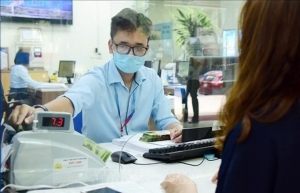Loopholes continue to play part in rising NPL ratios
 |
| Loopholes continue to play part in rising NPL ratios, illustration photo/ Source: freepik.com |
Darryl Dong, principle country officer of IFC Vietnam, emphasised the critical need for a robust framework to effectively address the increasing issue of non-performing loans (NPLs) during a seminar last week in Hanoi.
“In our current complex economic and political environment, compounded by global uncertainties, we’re seeing a marked increase in both corporate and consumer NPLs,” Dong explained.
The seminar, which focused on the challenges of NPLs in the consumer lending sector, highlighted the current tough period the industry is facing.
“Consumer credit growth is slowing, impacted by struggles in labour-intensive sectors such as production and exports,” Dong added, noting that adverse market conditions and tightened lending activities have led to increased NPL ratios.
Data from the Vietnam Banks Association (VBA) supports these concerns, showing that the NPL ratio for consumer credit rose from 3.8 per cent at the end of 2023 to over 4 per cent currently. Although finance companies have seen a slight reduction in NPLs, from 15 to 14.63 per cent, the levels remain concerning.
Furthermore, as of the end of February, consumer credit growth experienced a decline, decreasing by 2.5 per cent compared to last year’s December 31.
Nguyen Quoc Hung, vice chairman and secretary-general of the VBA, said, “The main reason for the negative growth in consumer credit is due to a reduction in demand driven by challenging economic conditions, which adversely affected personal and household incomes. This has led to an increased propensity to save as a precaution for the future, consequently diminishing the need for more bank-financed consumer spending.”
According to the VBA, the proliferation of app-based lending platforms, which offer lenient lending conditions, straightforward and fast procedures, easy accessibility, and do not require collateral, has diverted potential borrowers from traditional banks to these digital alternatives.
“Provisioning for rising NPL risks is leading to significant challenges, even losses. The task of debt recovery has become exceedingly difficult,” Hung added.
He also underscored the need for consumer finance companies and banks to enhance their standards and effectively manage NPLs, especially given the rise in borrowers who deliberately default on loans through social media platforms.
“When borrowers repay their debts, they should be offered considerations such as interest rate waivers or reductions, which indicates that banks are willing to cooperate and provide humane options for debt relief,” Hung suggested.
Le Quoc Ninh, board member and CEO of MCredit, said that, despite thorough reviews, there are still numerous instances where individuals exploit system loopholes to default on loans, which negatively impacts consumer lending.
“MCredit has also had to learn similar lessons. As a result, in our lending operations, we will have to conduct more rigorous audits in evaluating customers,” Ninh said. “For those who have borrowed, we continually review and provide guidance in cases where they face genuine financial hardships, facilitating debt repayment conditions in line with the State Bank of Vietnam (SBV) policies.”
Le Trung Kien of the Supervisory Inspection Agency at the SBV underscored the need for comprehensive legal guidelines to govern the consumer lending sector.
Ninh also noted that ongoing amendments to Circular No.43/2016/TT-NHNN aim to enhance communication and raise awareness about consumer finance, distinguishing it from loan sharking. In a petition to the Ministry of Public Security, Ninh suggested guidelines for prosecuting individuals deliberately evading debt repayment.
“We urge the creation of standardised procedures to address and prosecute intentional debt evasion. Furthermore, we recommend facilitating access for financial companies to the national population database to minimise identity theft and fraud,” he said.
“We urge media agencies to publish more articles that educate and reassure the public about the safety of accessing consumer finance from legitimate sources. This is crucial in our fight against the dangers of loan sharking,” he added.
At a monetary policy conference in late March, Deputy Prime Minister Le Minh Khai also urged a comprehensive review of the consumer lending landscape to address and resolve prevailing issues, facilitating more efficient operations within banks and financial companies.
“This initiative is aimed at diminishing the dependency on illegal lending,” stated DPM Khai.
He also stressed the importance of inter-ministerial cooperation to enhance credit quality and ensure the maintenance of safe bad debt ratios, in alignment with the overarching financial objectives.
| Moon Young So, general director Welcome Debt Trading Company We are convinced that establishing an official code of conduct for debt collection activities is paramount. The code is essential for establishing a comprehensive legal framework and clear operational mechanisms. It not only lays out crucial regulations, but also provides guidelines that both employees and companies must follow, ensuring that all interactions and transactions with clients adhere strictly to legal standards and societal norms. For clients, it serves as a foundation to ensure that debt recovery measures are executed in a fair, transparent, and appropriate manner. For businesses, it helps to minimise operational risks, enhance efficiency in debt collection activities, and foster the development of core values and mission statements. It guides all corporate actions and decisions within the framework of the law and ethical standards, safeguarding the company’s image and reputation. By establishing these rules and behavioural standards, the code enables organisations to operate within the legal limits, creating an efficient, fair, sustainable, and safe business environment. |
 | Non-performing loans boosted by regulation Banks are coming to grips with a tile of non-performing loans due to the pandemic. Kent Wong, partner and head of Banking and Capital Market at VCI Legal, portrays how the new circular’s debt rescheduling may affect banks, and how foreign banks could deal with distressed loans. |
 | Banks raise provisions in anticipation of bad debt In the face of rising bad debt amid the ongoing COVID-19 pandemic, commercial banks have been forced to write up their loan loss provisions, according to industry sources. |
 | Collectius acquires more than $800 million of non-performing loans in Vietnam Collectius, a leading restructuring partner for financial institutions in Asia, acquired its first portfolios in Vietnam since entering the market at the end of last year, securing more than $800 million of non-performing loans (NPL) from a local commercial bank. |
What the stars mean:
★ Poor ★ ★ Promising ★★★ Good ★★★★ Very good ★★★★★ Exceptional
 Tag:
Tag:
Related Contents
Latest News
More News
- Banking sector targets double-digit growth (February 23, 2026 | 09:00)
- Private capital funds as cornerstone of IFC plans (February 20, 2026 | 14:38)
- Priorities for building credibility and momentum within Vietnamese IFCs (February 20, 2026 | 14:29)
- How Hong Kong can bridge critical financial centre gaps (February 20, 2026 | 14:22)
- All global experiences useful for Vietnam’s international financial hub (February 20, 2026 | 14:16)
- Raised ties reaffirm strategic trust (February 20, 2026 | 14:06)
- Sustained growth can translate into income gains (February 19, 2026 | 18:55)
- The vision to maintain a stable monetary policy (February 19, 2026 | 08:50)
- Banking sector faces data governance hurdles in AI transition (February 19, 2026 | 08:00)
- AI leading to shift in banking roles (February 18, 2026 | 19:54)






















 Mobile Version
Mobile Version